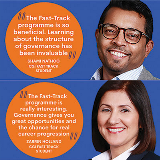*/
Why barristers are taking their practice offshore: a Q and A with Charlotte Morrish, former barrister and now legal recruiter at SteppingStones Legal
A: It really comes down to the unique combination of three things: the quality and variety of work on offer; the high financial rewards; and the work-life balance. The Cayman Islands, for example, is a leading financial centre and so barristers here are working on complex, high-value, cross-border disputes. The legal market is smaller, meaning greater exposure to higher quality work and the opportunity to be involved in the creation and development of jurisprudence. Competitive, tax-free salaries make the work extremely financially rewarding and this, combined with all the benefits of living on a Caribbean island, means working offshore is a very appealing prospect for barristers contemplating their future career options.
A: There is a real demand among the leading offshore law firms for junior commercial and chancery barristers with experience in complex commercial disputes, insolvency and trusts, as well as opportunities for those with broader civil, regulatory or family finance practices. As part of a relatively small team, you would undertake a range of advisory and advocacy work, with scope to expand and diversify your experience across a range of multi-jurisdictional matters. The ‘HNWIs’ or companies doing business in these jurisdictions will invariably have interests or assets elsewhere in a variety of structures, often resulting in complex concurrent proceedings. This necessitates collaboration with foreign legal teams and navigating jurisdictional and enforcement issues, making for an interesting, dynamic and challenging practice.
A: Perhaps most significantly, you would be employed. I know from experience that to forego the freedom of self-employment is difficult, but there is also a great deal of freedom associated with having a guaranteed income every month, full private health insurance, a pension and never having to get on another 5am train to a far-flung court centre! Having a routine can be virtually impossible to achieve at the Bar, whereas working in a firm offers structure and the ability to make plans outside of work, while still allowing for flexibility within the working day. Being part of a team also means collaborating on strategy, tactics and case management throughout the litigation process.
A: The working day is usually 8.30am-5.30pm; as you might expect, there are times when longer hours are required, but your office is unlikely to be more than about ten minutes from where you live and there is a single, centrally located court centre. A typical day usually comprises a mixture of drafting pleadings, skeleton arguments or opinions; legal research; client conferences; and liaising with other parties, expert witnesses, instructed silks etc. Regular seminars and networking events make for a lively and collegiate atmosphere among the profession.
A: It’s wonderful. Here in the Cayman Islands we have all the facilities, restaurants and modern infrastructure you would expect from a leading financial centre, but with the addition of incredible white sandy beaches and year-round sunshine – everything you need to enjoy life in paradise. The lack of commute and convenience of island life means you can really make the most of your time.
A: As a UK-qualified lawyer you would be eligible to practise offshore without the need to sit any exams or cross-qualify; the legal systems, principles and procedures are based on UK law which makes for an easy transition. Most barristers retain close connections with chambers and that enduring relationship often proves mutually beneficial. The relocation process itself is a straightforward and well-trodden path. SteppingStones Legal will provide you with insight, advice and guidance from the outset, helping you settle into island life.
Charlotte was an experienced criminal barrister in the UK before relocating to the Cayman Islands in 2019 with her partner (also a barrister and who now works with one of the leading offshore law firms). She works alongside the leading law firms in Cayman and other offshore jurisdictions and her background and experience means she is uniquely placed to understand the needs of barristers contemplating a move overseas. See: www.steppingstonesrecruitment.com/legal
A: It really comes down to the unique combination of three things: the quality and variety of work on offer; the high financial rewards; and the work-life balance. The Cayman Islands, for example, is a leading financial centre and so barristers here are working on complex, high-value, cross-border disputes. The legal market is smaller, meaning greater exposure to higher quality work and the opportunity to be involved in the creation and development of jurisprudence. Competitive, tax-free salaries make the work extremely financially rewarding and this, combined with all the benefits of living on a Caribbean island, means working offshore is a very appealing prospect for barristers contemplating their future career options.
A: There is a real demand among the leading offshore law firms for junior commercial and chancery barristers with experience in complex commercial disputes, insolvency and trusts, as well as opportunities for those with broader civil, regulatory or family finance practices. As part of a relatively small team, you would undertake a range of advisory and advocacy work, with scope to expand and diversify your experience across a range of multi-jurisdictional matters. The ‘HNWIs’ or companies doing business in these jurisdictions will invariably have interests or assets elsewhere in a variety of structures, often resulting in complex concurrent proceedings. This necessitates collaboration with foreign legal teams and navigating jurisdictional and enforcement issues, making for an interesting, dynamic and challenging practice.
A: Perhaps most significantly, you would be employed. I know from experience that to forego the freedom of self-employment is difficult, but there is also a great deal of freedom associated with having a guaranteed income every month, full private health insurance, a pension and never having to get on another 5am train to a far-flung court centre! Having a routine can be virtually impossible to achieve at the Bar, whereas working in a firm offers structure and the ability to make plans outside of work, while still allowing for flexibility within the working day. Being part of a team also means collaborating on strategy, tactics and case management throughout the litigation process.
A: The working day is usually 8.30am-5.30pm; as you might expect, there are times when longer hours are required, but your office is unlikely to be more than about ten minutes from where you live and there is a single, centrally located court centre. A typical day usually comprises a mixture of drafting pleadings, skeleton arguments or opinions; legal research; client conferences; and liaising with other parties, expert witnesses, instructed silks etc. Regular seminars and networking events make for a lively and collegiate atmosphere among the profession.
A: It’s wonderful. Here in the Cayman Islands we have all the facilities, restaurants and modern infrastructure you would expect from a leading financial centre, but with the addition of incredible white sandy beaches and year-round sunshine – everything you need to enjoy life in paradise. The lack of commute and convenience of island life means you can really make the most of your time.
A: As a UK-qualified lawyer you would be eligible to practise offshore without the need to sit any exams or cross-qualify; the legal systems, principles and procedures are based on UK law which makes for an easy transition. Most barristers retain close connections with chambers and that enduring relationship often proves mutually beneficial. The relocation process itself is a straightforward and well-trodden path. SteppingStones Legal will provide you with insight, advice and guidance from the outset, helping you settle into island life.
Charlotte was an experienced criminal barrister in the UK before relocating to the Cayman Islands in 2019 with her partner (also a barrister and who now works with one of the leading offshore law firms). She works alongside the leading law firms in Cayman and other offshore jurisdictions and her background and experience means she is uniquely placed to understand the needs of barristers contemplating a move overseas. See: www.steppingstonesrecruitment.com/legal

No-one should have to live in sub-standard accommodation, says Antony Hodari Solicitors. We are tackling the problem of bad housing with a two-pronged approach and act on behalf of tenants in both the civil and criminal courts

Pupillage offers hit new record exceeding pre-pandemic levels, Bar Council report finds

What’s it like being a Senior Crown Prosecutor? Stuart Page describes what drew him to the role, the skills required, and a typical day in the life

Harry Hodgkin, CEO of The Barrister Group, gives an insight into Chambers' core principles and the individual barrister's experience

Congratulations to the Crown Prosecution Service – a Top 10 Employer for Working Families 2023

With the explosion of interest in governance and the growing need to be multi-skilled to keep career options open, adding an extra string to your bow is not without its merits. The Chartered Governance Institute UK Ireland (CGIUKI) Fast Track for the Chartered Governance Qualifying Programme could be ideal for experienced professionals to reach chartered governance status